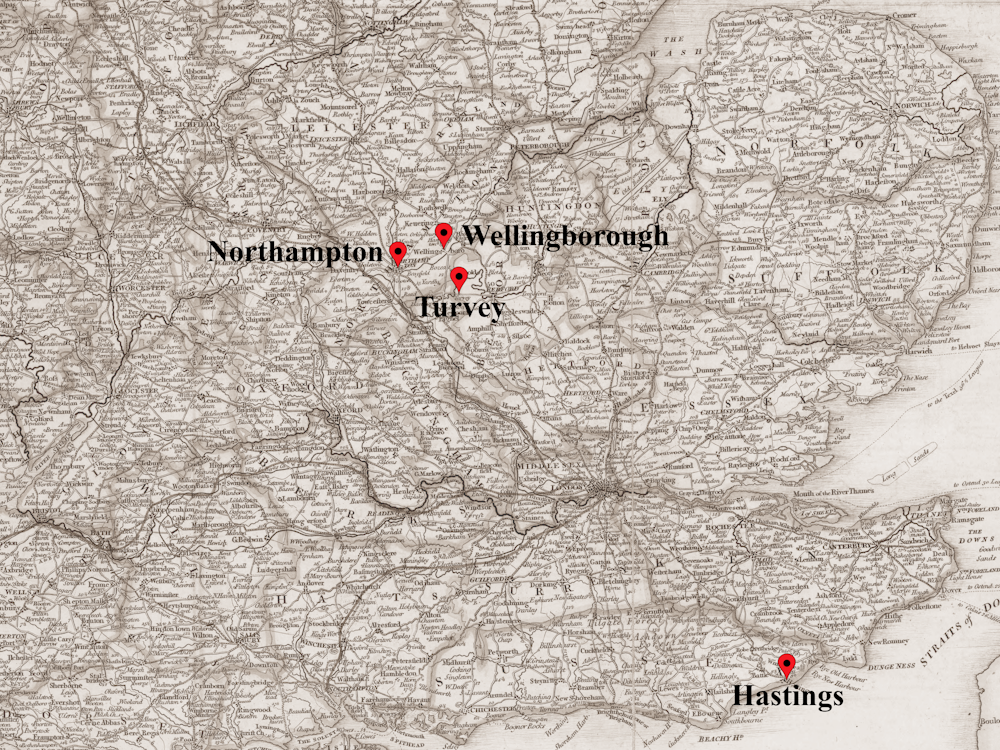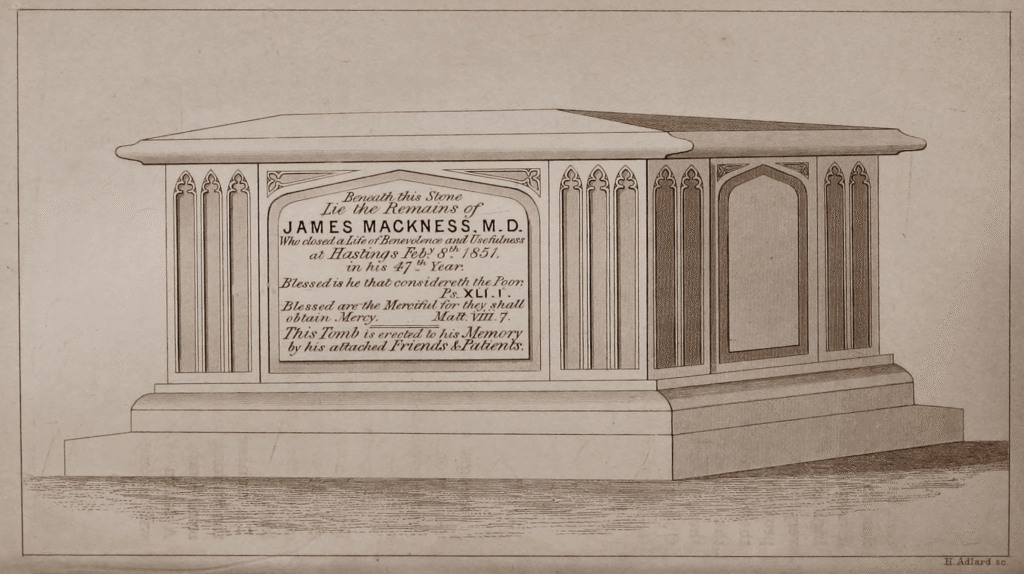Some lives leave their mark not through fame or fortune, but through the steady, faithful service they give to those around them. One such figure is Dr. James Mackness, a 19th-century physician whose story unfolds across the towns and villages of Northamptonshire, Bedfordshire, and Sussex. His is a tale of resilience, compassion, and devotion — to both medicine and the communities he served.1

Early Life in Wellingborough
James Mackness was born on 31 March 1804 in Wellingborough, Northamptonshire. His family life was shaped by contrast: a father, Thomas Mackness, full of talent but given to restless habits and indulgences, and a mother, Beulah Gent, whose deep religious faith sustained her through domestic difficulties.
From an early age, James faced challenges. At just five, he endured a painful operation for a bladder stone — an ordeal that would mark a lifetime of health struggles. When he was eight, his parents moved to Edinburgh, leaving young James in Wellingborough, where he experienced harsh treatment at school but developed an early love of learning.
A Student of Medicine in Edinburgh
Around the age of twelve, James rejoined his family in Edinburgh. There, his passion for books took hold. He scoured bookstalls for volumes by Addison, Goldsmith, and other classic authors, often selling them at a loss to fund his next purchase.
Though destined for a career in the drapery trade, James yearned to become a doctor. With his mother’s support, he persuaded his reluctant father to allow him to pursue medicine. By eighteen, he was studying anatomy, Latin, and chemistry, while also shouldering the burden of his father’s failing business.
Despite setbacks, including a failed surgical exam, James persevered. After a period of intense study at Craig Rothie near St. Andrews, he passed the College of Surgeons in 1824.
A Calling to Rural Medicine: Turvey
Following assistant positions in Yarmouth and Saxmundham, Mackness returned to Wellingborough in 1827 after his father’s death. Keen to establish his own practice, he settled in Turvey, a picturesque Bedfordshire village lacking a resident doctor.
His arrival was humble — much of his journey completed on foot to save money — but he quickly became a valued figure in the community. In 1830, he married Maria Whitworth, the daughter of a local landowner. The couple’s life in Turvey was marked by close friendships, community work, and Mackness’s enduring concern for the poor.
Northampton: A Wider Sphere
After four fruitful years, Mackness sought broader opportunities. In 1831, he moved to Northampton, taking up residence in Sheep Street in a house once inhabited by the famed preacher Philip Doddridge.
His practice flourished, covering both town and country patients, often attending difficult midwifery cases and emergencies. Yet Mackness’s concerns extended beyond medicine. He was instrumental in founding the town’s Mechanics’ Institute and Equitable Friendly Institution, dedicated to the education and welfare of working people.
Struggles with Ill Health
The strain of relentless work and underlying frailty soon took a toll. In 1834, after an attack of malaria, he developed severe neuralgia, marked by debilitating pain and weakness. Despite consultations with leading physicians such as Sir Charles Bell, no lasting relief was found.
By 1836, Mackness’s health forced him to withdraw from practice. He sought respite in Jersey, and later in Clifton, Belgium, and Paris, ever in pursuit of a kinder climate and recovery.

A New Chapter in Hastings
In 1840, Mackness returned to academic study in Edinburgh and earned his Doctor of Medicine from St. Andrews that May. On medical advice, he and Maria moved to Hastings, a town whose sandy subsoil was believed beneficial for neuralgic complaints.
Though entering a crowded medical market, Mackness quickly built a reputation for skill and kindness. He published Hastings, a Resort for Invalids (1842), advocating for the town as a health destination, and later The Moral Aspects of Medical Life, reflecting his ethical approach to practice.
Final Years and Legacy
Despite ongoing struggles with illness, Mackness remained dedicated to his work and community. In early 1851, a severe neuralgic episode led to pneumonia. After several days of decline, Dr. James Mackness died on 8 February 1851, aged just 46.
His passing was deeply felt in Hastings. The funeral, held on 14 February, was attended by the town’s mayor, medical colleagues, friends, and townspeople alike — a fitting tribute to a man remembered for both his professional skill and his unassuming goodness.

A Physician Remembered
In an age where fame often eclipses quiet virtue, James Mackness’s life stands as a testament to the value of faithful, compassionate service. Whether in Wellingborough, Turvey, Northampton, or Hastings, he left behind a legacy of integrity, community care, and a humane spirit that touched countless lives.
As one contemporary remarked, Mackness “resembled Him who went about doing good.” His story, though modest in outward renown, is rich in the quieter triumphs of character and conscience.
Thank you for reading. If you enjoy local histories and the stories of unsung figures like Dr. Mackness, feel free to explore other posts in my archive or subscribe for more tales from the past. This post will in time form part of a series on the Mechanics’ Institute in Northampton.
- An extensive biography of James Mackness was edited by his friend Mary Howard. Howard, Mary Matilda. Memorials of James Mackness, Esq., M.D. : Author of Hastings, a Resort for Invalids, Moral Aspects of Medical Life, Dysphonia Clericorum, &c. &c. John Churchill, 1851.
© Copyright : Graham Ward. All rights reserved.